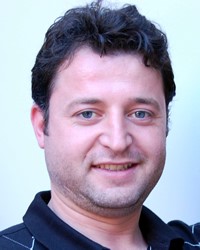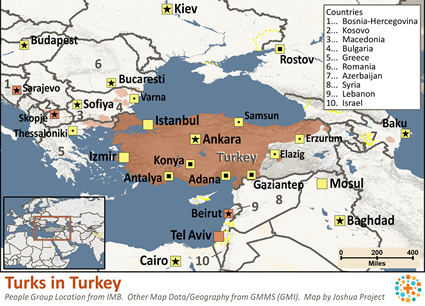Turkey is considered to be a "link" between the Orient (Chinese and Mongols) and the Occidental (Anglo-Saxons, Slavs, Goths, and Latins). The Turk, therefore, have a knowledge and mixture of both Eastern and Western cultures. The Turks represent a great opportunity to create a "fulcrum" church movement that could reach many other Muslim people groups.
Though traditional ways continue to exist in some areas, the typical urban Turks lives a secularized, modern life, with all the materialistic advantages and temptations that go with it. Some Turkish men and women are doctors, lawyers, architects or engineers. About 60% of Turks live in major cities such as Istanbul (with 15 million people), Ankara, Izmir and Adana. About 40% of Turks are employed in agricultural sector living in villages and using natural resources to earn a living. Some peasants live as nomads, moving their sheep from place to place in search of greener pastures and dwelling in tents or huts.
Rural Turkish men work outside while the women spin yarn, dry fruits and vegetables for winter, prepare meals for their families, care for the children, and do the household chores. They also sometimes help with the men's work. Children help their parents with the outside duties if no school is located in their community. They may ride in ox-drawn grain carts or help make colorful knots in rugs.
The diet of rural Turks consists of a heavy bread, olives, cheese from sheep or cow's milk, onions, molasses from grapes, fresh fruits, vegetables and nuts. Meats such as fish, wild game, or poultry are only eaten once a week. Wealthier farmers may also eat lamb and beef, but Islam prohibits them from eating pork.
Urban or rural, relaxation is of the utmost importance to the Turk. Coffee houses are places where men meet to visit and talk politics or business. In general, the Turks are courteous, gentle people who readily show hospitality to strangers. They are also very patriotic and have a deep sense of nationalistic pride and love for their country. For that reason, they get offended if one brings up the atrocities of the Ottoman Empire, etc.
The Turks of Turkey are predominantly nominally Sunni Muslim, believing in one god (Allah), and an eternal heaven and hell. However, they also have many ethnic beliefs as well. For example, they believe that men have the power to curse others by giving them the "evil eye." They believe that one is protected against such a curse by wearing blue beads, which the evil eye cannot face. Another way to avoid this cursing glare is to spit in a fire and pray to Allah. They also believe that if a woman puts fish oil around a door and a man walks through it, he will love her for the rest of his life.
One of the unique characteristics of Turkey is that they are a country where Muslims sometimes go and pray in churches and synagogues on special occasions. Judaism and Christianity and their prophets are generally respected by Turks.
Although the Turks of Turkey have Christian resources (both the Bible and the JESUS Film have been translated into Turkish) available to them in their language and missions agencies have worked among them, they remain strongly Muslim. Prayer alone has the power to break through spiritual strongholds.
There are negative attributes of modern urban life such as drunkenness, drug use and prostitution. Such an atmosphere can lead to identity crises that could lead individuals to Christ, or to fundamentalist Islam or to self-destruction. Memories of conflict with Christians might pose a barrier to Turks accepting the blood sacrifice of Christ.
Pray that churches and missions organizations will accept the challenge of adopting and reaching the Turks.
Ask God to give the Turkish believers boldness to share the gospel with their own people.
Pray that God will grant wisdom and favor to mission agencies focusing on Turks.
Ask the Lord to save key leaders among the Turks who will boldly declare the gospel.
Pray that many Turks living abroad will be reached with the gospel and will take it back to Turkey.
Pray that Turkey will avoid both ethnic strife (especially with the Kurds) and resurgent Muslim fundamentalism.
Scripture Prayers for the Turk in Türkiye (Turkey).
Thomas Watch
| Profile Source: Joshua Project |


























